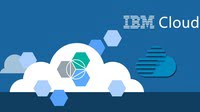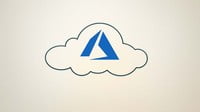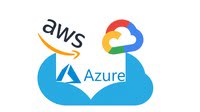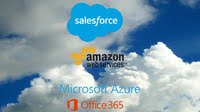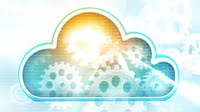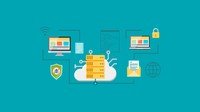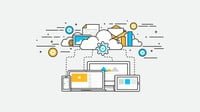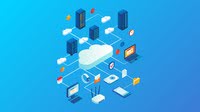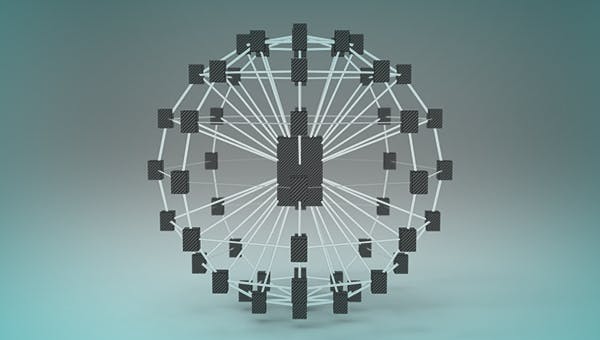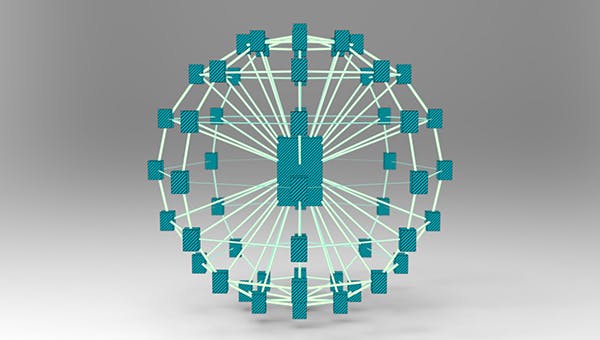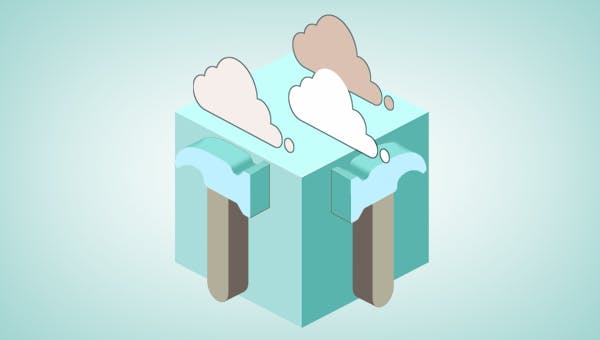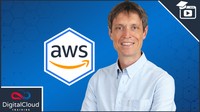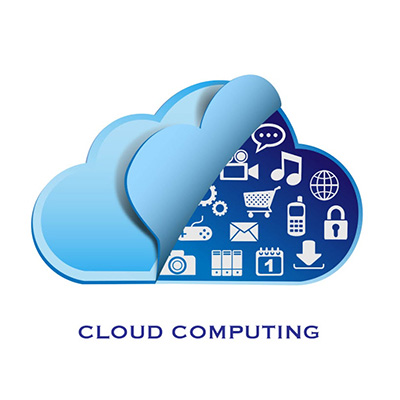
In this article you can find online courses to Elevate your Cloud Computing Skills.
Simply put, cloud computing is the delivery of computing services—including servers, storage, databases, networking, software, analytics, and intelligence—over the Internet (“the cloud”) to offer faster innovation, flexible resources, and economies of scale. You typically pay only for cloud services you use, helping you lower your operating costs, run your infrastructure more efficiently, and scale as your business needs change.
Cloud computing relies on sharing of resources to achieve coherence and economies of scale. Advocates of public and hybrid clouds note that cloud computing allows companies to avoid or minimize up-front IT infrastructure costs.
Proponents also claim that cloud computing allows enterprises to get their applications up and running faster, with improved manageability and less maintenance, and that it enables IT teams to more rapidly adjust resources to meet fluctuating and unpredictable demand, providing the burst computing capability: high computing power at certain periods of peak demand. Cloud providers typically use a “pay-as-you-go” model, which can lead to unexpected operating expenses if administrators are not familiarized with cloud-pricing models.
The availability of high-capacity networks, low-cost computers and storage devices as well as the widespread adoption of hardware virtualization, service-oriented architecture and autonomic and utility computing has led to growth in cloud computing. As of 2017, most cloud computers run a Linux-based operating system.
In the following list, you can find the top 15 online courses about Cloud Computing for experienced or beginner programmers. Enjoy!
Microsoft Azure and Cloud Computing: The Basics
Scott Duffy via Udemy
This course was created to go through the basics of cloud and cloud platforms. It’s a 45–minute introduction for people who are curious about it, and want to know if it’s something they want to learn more about. I love sharing my passion for technology and cloud computing with students, and thank you for having a look.
★★★★(4-star rating)
Cloud Computing with IBM Bluemix
Harshit Srivastava via Udemy
This is a beginner level course that can be taken by the professionals and students alike, but with different aspirations. If you are working in the Technology sector, and would like to learn some of the advanced tools and services that you can harness in your project, you can take this course on IBM Cloud. It ranges from various customizable IBM Watson Machine learning services, to web containers and mobile push notifications.
★★★★(4-star rating)
Cloud Computing with Microsoft Azure BUNDLE 2021 [updated]
Pranjal Srivastava via Udemy
Microsoft Azure is one of the most popular Cloud Computing platforms with wide range of tools and services that are remotely accessible from anywhere in the world. Currently, Azure is the fastest growing Cloud Computing platform. So, if you are already familiar with AWS or you are just starting with Azure, this course could provide you comprehensive learning (with roughly 18 hours of content) on a large number of cloud services with hands–on practical examples on Microsoft Azure.
★★★★(4-star rating)
Introduction to Cloud Computing with AWS, Azure and GCP
Girish D via Udemy
Getting started with cloud technologies can be daunting with the number of cloud providers in the market and also hundreds of services, in the form of building blocks, offered by each cloud provider. This course is an introductory level course for understanding the cloud technology concepts and gives a detailed introduction to the three largest cloud providers: Amazon Web Service (AWS), Microsoft Azure and Google Cloud Platform (GCP).
★★★★(4-star rating)
Cloud Computing Development Essentials
Destin Learning via Udemy
In this class I will teach you the basics of cloud computing and the advantages and limitations of Cloud Computing. In addition, I will show you how to sign up for free developer accounts with some of the leading cloud computing platforms such as Amazon AWS, Microsoft Azure, SalesForce and Office 365. I will also take you on a brief tour of each of these platforms and show you how to deploy software to each of these as well. By the end of this class you will be able to develop and deploy software to the leading cloud based system on the market today.
★★★★★(5-star rating)
Distributed Systems & Cloud Computing with Java
Michael Pogrebinsky via Udemy
Have you been wondering how modern companies handle massive amount of internet traffic and transactions? Securely store billions of our photos, videos and other data? Provide impeccable user experience and high performance 24/7 all around the globe? Then you are in the perfect place! In this course you will: Master the theory of Distributed Systems, Distributed Computing and modern Software Architecture. Gain the practical skills necessary to build Distributed Applications and Parallel Algorithms, focusing on Java based technologies and much more.
★★★★★(5-star rating)
Cloud Computing Concepts
Tek Smart Learning via Udemy
This course helps you to understand the much needed concepts of the Cloud Computing. We have clearly explained how Traditional IT environment works and how Cloud Computing differs from it. You will understand the various models of Cloud Computing, the leading Cloud Computing platforms, comparisons between the platforms. We have also dedicated a chapter with information on various certification paths and learning resources for Cloud Computing. As a bonus we have explained various considerations that needs to be taken into account before or while moving to a Cloud platform.
★★★★(4-star rating)
Getting Started with Cloud Computing – Level 1
Idan Gabrieli via Udemy
Cloud Computing is becoming the mainstream in the IT world as a growing amount of companies around the globe are in the process of a digital transforming while using the power of cloud–based services. Some of our readers say: This was an excellent course that took me from zero knowledge to understanding the rationale for ‘the Cloud’, the benefits of Cloud technology and how Cloud technology works in some reasonable detail. I’m very very pleased with Idan’s course.
★★★★(4-star rating)
Microsoft Azure: Cloud Computing Made Easy: 3-in-1
Packt Publishing via Udemy
This comprehensive 3–in–1 course equips you with the practical know–how of managing various Azure Services for effective business over the cloud. You will be taken through the core of Infrastructure as a Service (IaSS) with Microsoft Azure to leverage different services offered by it. You will then learn different hybrid solutions used in Azure to build your own fully functional hybrid cloud management with Operations Management Suite. You will also master Azure services to build Platform as a Service (PaaS) cloud wherein you will be able to configure your web and API applications, and manage and test application performance.
★★★★(4-star rating)
Cloud Computing Concepts: Part 2 (FREE)
Indranil Gupta via Coursera
Some of theconcepts include in this course are: clouds, MapReduce, key–value/NoSQL stores, classical distributed algorithms, widely–used distributed algorithms, scalability, trending areas, and much, much more! Know how these systems work from the inside out. Get your hands dirty using these concepts with provided homework exercises. In the programming assignments, implement some of these concepts in template code (programs) provided in the C++ programming language. Prior experience with C++ is required. The course also features interviews with leading researchers and managers, from both industry and academia. This course builds on the material covered in the Cloud Computing Concepts, Part 1 course.
★★★★★(5-star rating)
Cloud Computing Concepts, Part 1 (FREE)
Indranil Gupta via Coursera
Some of theconcepts include in this course are: clouds, MapReduce, key–value/NoSQL stores, classical distributed algorithms, widely–used distributed algorithms, scalability, trending areas, and much, much more! Know how these systems work from the inside out. Get your hands dirty using these concepts with provided homework exercises. In the programming assignments, implement some of these concepts in template code (programs) provided in the C++ programming language. Prior experience with C++ is required. The course also features interviews with leading researchers and managers, from both industry and academia.
★★★★★(5-star rating)
Cloud Computing Applications, Part 1: Cloud Systems and Infrastructure (FREE)
Roy H. Campbell via Coursera
In this first course we cover a multitude of technologies that comprise the modern concept of cloud computing. Cloud computing is an information technology revolution that has just started to impact many enterprise computing systems in major ways, and it will change the face of computing in the years to come. We start the first week by introducing some major concepts in cloud computing, the economics foundations of it and we introduce the concept of big data. We also cover the concept of software defined architectures, and how virtualization results in cloud infrastructure and how cloud service providers organize their offerings.
★★★★(4-star rating)
Cloud Computing Applications, Part 2: Big Data and Applications in the Cloud (FREE)
Roy H. Campbell via Coursera
In this second course we continue Cloud Computing Applications by exploring how the Cloud opens up data analytics of huge volumes of data that are static or streamed at high velocity and represent an enormous variety of information. Cloud applications and data analytics represent a disruptive change in the ways that society is informed by, and uses information. We start the first week by introducing some major systems for data analysis including Spark and the major frameworks and distributions of analytics applications including Hortonworks, Cloudera, and MapR.
★★★★(4-star rating)
Complete Python for data science and cloud computing
Datagist INC via Udemy
In this nearly 50 hours course, we will walk through the complete Python for starting the career in data science and cloud computing! This is so far the most comprehensive guide to mastering data science, business analytics, statistical tests & modelling, data visualization, machine learning, cloud computing, Big data analysis and real world use cases with Python. This course not only covers all aspects of practical data science, but also the necessary data engineering skills and business model & knowledge you need in different industries.
★★★★(4-star rating)
Introduction to Cloud Computing on Amazon AWS for Beginners
via Udemy
This introduction to cloud computing on Amazon AWS course takes you from the AWS basics to being a competent AWS cloud practitioner. You’ll learn general cloud computing concepts and AWS from fundamentals right through to advanced concepts. You’ll also build hands–on skills using many of the core Amazon Web Services (AWS) services. Ideal for beginners – absolutely no cloud computing experience is required! If you’re interested in moving into a high–paying career working with cloud computing services – this is the best way to get started.
★★★★★(5-star rating)


